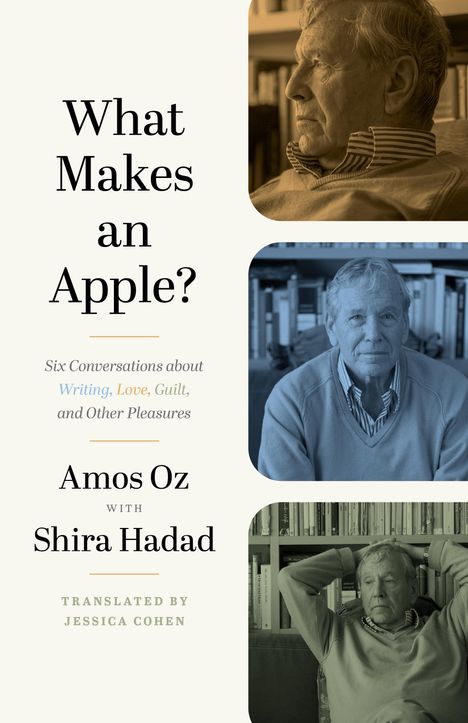Amos Oz: What Makes an Apple?, Kartoniert / Broschiert
What Makes an Apple?
Buch
- Six Conversations about Writing, Love, Guilt, and Other Pleasures
lieferbar innerhalb 1-2 Wochen
(soweit verfügbar beim Lieferanten)
(soweit verfügbar beim Lieferanten)
Aktueller Preis: EUR 15,94
Versandkosten
(United States of America): EUR 19,90
- Verlag:
- Princeton University Press, 11/2025
- Einband:
- Kartoniert / Broschiert
- Sprache:
- Englisch
- ISBN-13:
- 9780691230276
- Artikelnummer:
- 12241303
- Umfang:
- 152 Seiten
- Gewicht:
- 181 g
- Maße:
- 216 x 140 mm
- Stärke:
- 9 mm
- Erscheinungstermin:
- 4.11.2025
- Hinweis
-
Achtung: Artikel ist nicht in deutscher Sprache!
Weitere Ausgaben von What Makes an Apple? |
Preis |
|---|
Klappentext
Translation of: Mi-mah °asui ha-tapuaòh.
Biografie
Amos Oz wurde 1939 als Amos Klausner in Jerusalem geboren und wuchs auch dort auf. Seine Eltern waren 1917 von Odessa nach Wilna (damals Polen) geflüchtet und wanderten von dort nach Palästina aus. 1954 trat er dem Kibbuz Chulda bei und nahm den Namen Oz an, der auf hebräisch Kraft, Stärke bedeutet. Von 1960 bis 1963 studierte er Literatur und Philosophie an der hebräischen Universität in Jerusalem und kehrte nach seinem Bachelor-Abschluss in den Kibbuz zurück und lehrte bis 1986 Literatur und Philosophie an der Oberschule Hulda. Seit dem 6-Tage-Krieg war er in der israelischen Friedensbewegung aktiv und befürwortete eine Zwei-Staaten-Bildung im israelisch-palästinensichen Konflikt. Er ist Mitbegründer und herausragender Vertreter der seit 1977 bestehenden Friedensbewegung Schalom achschaw (Peace now). Seit 1987 lehrt er Hebräische Literatur an der Ben-Gurion Universität von Negev, Beesheba. Die Werke von Amos Oz wurden in 37 Sprachen übersetzt. Er hat zahlreiche Preise und Auszeichnungen erhalten, u. a. im Jahr 2013 den Franz-Kafka-Preis und 2014 den Siegfried-Lenz-Preis.
Amos Oz
What Makes an Apple?
Aktueller Preis: EUR 15,94

